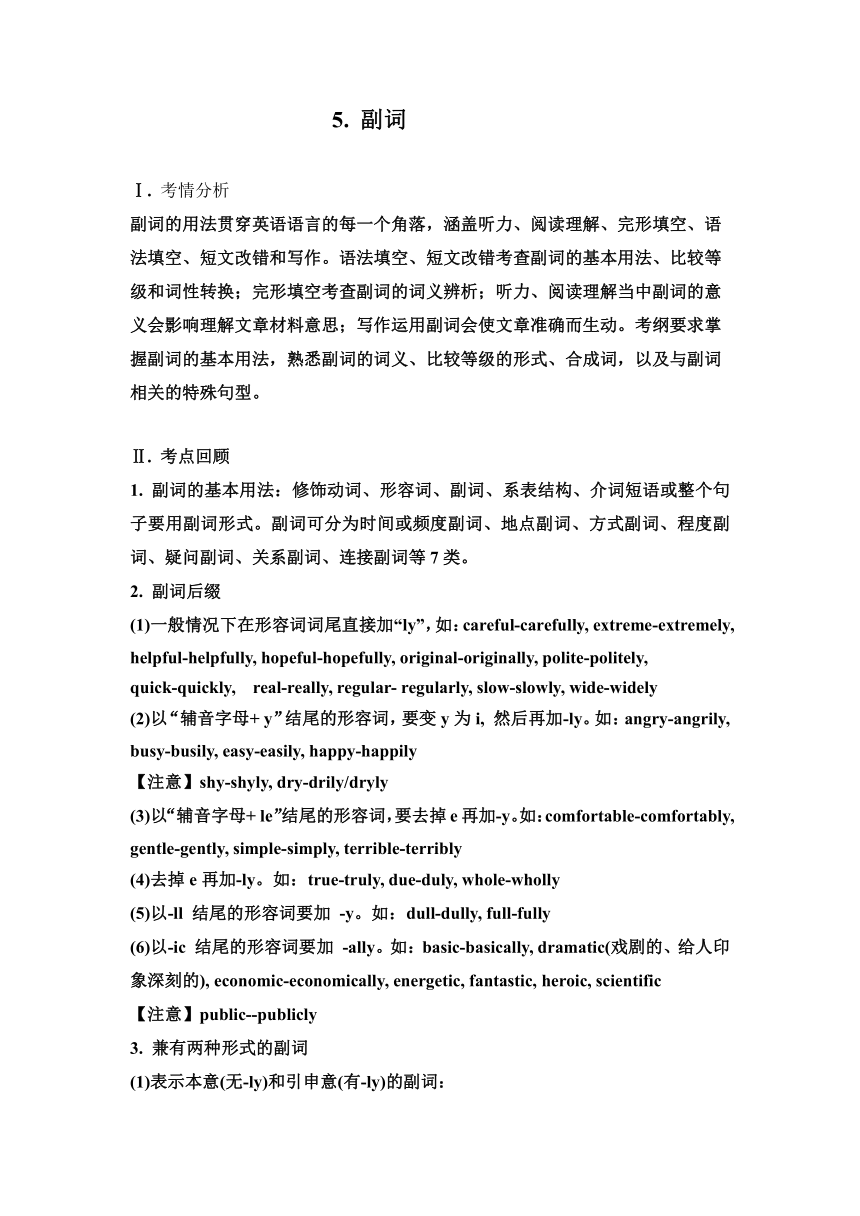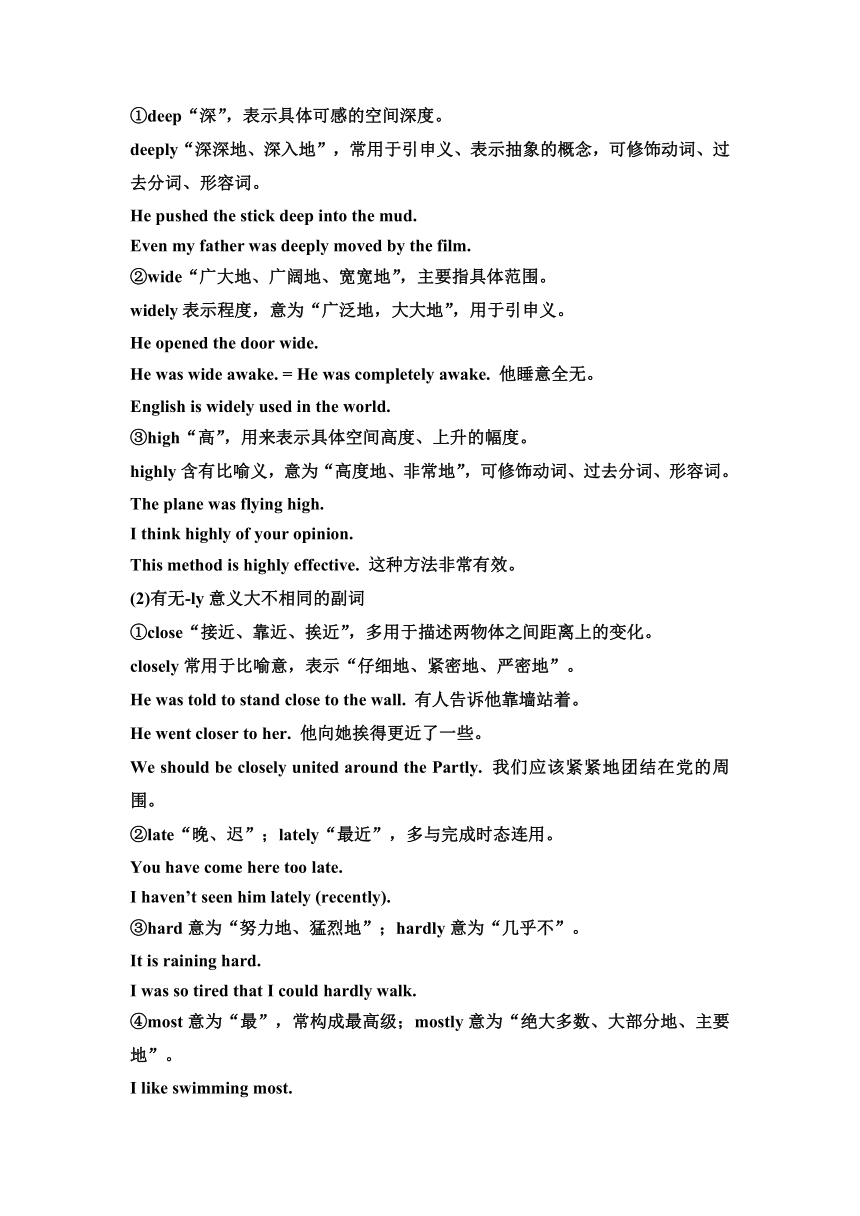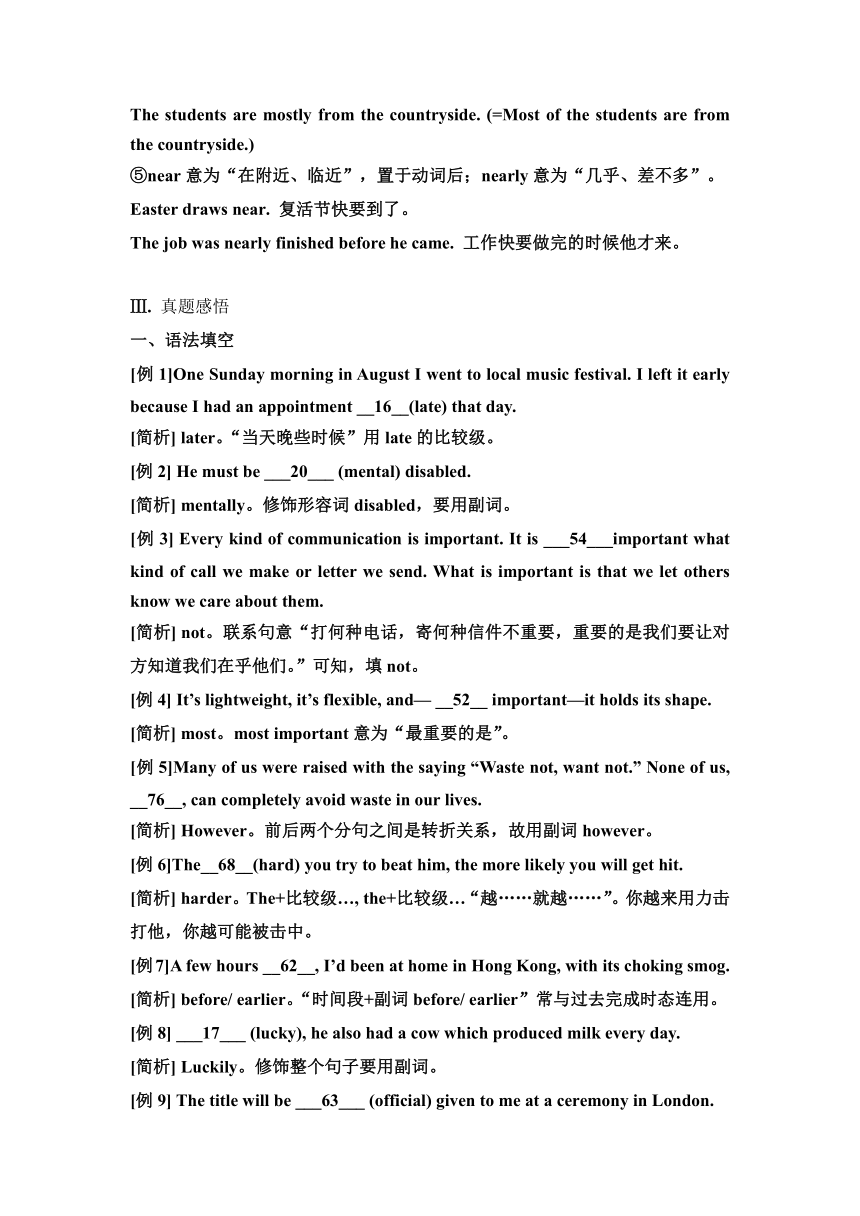2022年高考英语二轮复习:副词学案(含答案)
文档属性
| 名称 | 2022年高考英语二轮复习:副词学案(含答案) |  | |
| 格式 | docx | ||
| 文件大小 | 28.9KB | ||
| 资源类型 | 教案 | ||
| 版本资源 | 通用版 | ||
| 科目 | 英语 | ||
| 更新时间 | 2022-04-06 18:51:14 | ||
图片预览



文档简介
5. 副词
Ⅰ. 考情分析
副词的用法贯穿英语语言的每一个角落,涵盖听力、阅读理解、完形填空、语法填空、短文改错和写作。语法填空、短文改错考查副词的基本用法、比较等级和词性转换;完形填空考查副词的词义辨析;听力、阅读理解当中副词的意义会影响理解文章材料意思;写作运用副词会使文章准确而生动。考纲要求掌握副词的基本用法,熟悉副词的词义、比较等级的形式、合成词,以及与副词相关的特殊句型。
Ⅱ. 考点回顾
1. 副词的基本用法:修饰动词、形容词、副词、系表结构、介词短语或整个句子要用副词形式。副词可分为时间或频度副词、地点副词、方式副词、程度副词、疑问副词、关系副词、连接副词等7类。
2. 副词后缀
(1)一般情况下在形容词词尾直接加“ly”,如:careful-carefully, extreme-extremely, helpful-helpfully, hopeful-hopefully, original-originally, polite-politely, quick-quickly, real-really, regular- regularly, slow-slowly, wide-widely
(2)以“辅音字母+ y”结尾的形容词,要变y为i, 然后再加-ly。如:angry-angrily, busy-busily, easy-easily, happy-happily
【注意】shy-shyly, dry-drily/dryly
(3)以“辅音字母+ le”结尾的形容词,要去掉e再加-y。如:comfortable-comfortably, gentle-gently, simple-simply, terrible-terribly
(4)去掉e再加-ly。如:true-truly, due-duly, whole-wholly
(5)以-ll 结尾的形容词要加 -y。如:dull-dully, full-fully
(6)以-ic 结尾的形容词要加 -ally。如:basic-basically, dramatic(戏剧的、给人印象深刻的), economic-economically, energetic, fantastic, heroic, scientific
【注意】public--publicly
3. 兼有两种形式的副词
(1)表示本意(无-ly)和引申意(有-ly)的副词:
①deep“深”,表示具体可感的空间深度。
deeply“深深地、深入地”,常用于引申义、表示抽象的概念,可修饰动词、过去分词、形容词。
He pushed the stick deep into the mud.
Even my father was deeply moved by the film.
②wide“广大地、广阔地、宽宽地”,主要指具体范围。
widely表示程度,意为“广泛地,大大地”,用于引申义。
He opened the door wide.
He was wide awake. = He was completely awake. 他睡意全无。
English is widely used in the world.
③high“高”,用来表示具体空间高度、上升的幅度。
highly含有比喻义,意为“高度地、非常地”,可修饰动词、过去分词、形容词。
The plane was flying high.
I think highly of your opinion.
This method is highly effective. 这种方法非常有效。
(2)有无-ly意义大不相同的副词
①close“接近、靠近、挨近”,多用于描述两物体之间距离上的变化。
closely常用于比喻意,表示“仔细地、紧密地、严密地”。
He was told to stand close to the wall. 有人告诉他靠墙站着。
He went closer to her. 他向她挨得更近了一些。
We should be closely united around the Partly. 我们应该紧紧地团结在党的周围。
②late“晚、迟”;lately“最近”,多与完成时态连用。
You have come here too late.
I haven’t seen him lately (recently).
③hard意为“努力地、猛烈地”;hardly意为“几乎不”。
It is raining hard.
I was so tired that I could hardly walk.
④most意为“最”,常构成最高级;mostly意为“绝大多数、大部分地、主要地”。
I like swimming most.
The students are mostly from the countryside. (=Most of the students are from the countryside.)
⑤near意为“在附近、临近”,置于动词后;nearly意为“几乎、差不多”。
Easter draws near. 复活节快要到了。
The job was nearly finished before he came. 工作快要做完的时候他才来。
Ⅲ. 真题感悟
一、语法填空
[例1]One Sunday morning in August I went to local music festival. I left it early because I had an appointment __16__(late) that day.
[简析] later。“当天晚些时候”用late的比较级。
[例2] He must be ___20___ (mental) disabled.
[简析] mentally。修饰形容词disabled,要用副词。
[例3] Every kind of communication is important. It is ___54___important what kind of call we make or letter we send. What is important is that we let others know we care about them.
[简析] not。联系句意“打何种电话,寄何种信件不重要,重要的是我们要让对方知道我们在乎他们。”可知,填not。
[例4] It’s lightweight, it’s flexible, and— __52__ important—it holds its shape.
[简析] most。most important意为“最重要的是”。
[例5]Many of us were raised with the saying “Waste not, want not.” None of us, __76__, can completely avoid waste in our lives.
[简析] However。前后两个分句之间是转折关系,故用副词however。
[例6]The__68__(hard) you try to beat him, the more likely you will get hit.
[简析] harder。The+比较级…, the+比较级…“越……就越……”。你越来用力击打他,你越可能被击中。
[例7]A few hours __62__, I’d been at home in Hong Kong, with its choking smog.
[简析] before/ earlier。“时间段+副词before/ earlier”常与过去完成时态连用。
[例8] ___17___ (lucky), he also had a cow which produced milk every day.
[简析] Luckily。修饰整个句子要用副词。
[例9] The title will be ___63___ (official) given to me at a ceremony in London.
[简析] officially。修饰动词要用副词。
[例10]Even __66__ (bad), the amount of fast food that people eat goes up.
[简析] worse。even修饰比较级意为“更加……”,even worse“更糟糕的是”。
[例11] Steam engines were used to pull the carriages and it must have been __66__ (fair) unpleasant for the passengers, with all the smoke and noise.
[简析] fairly。修饰形容词要用副词形式。
[例12]Pahlsson screamed __58__ loudly that her daughter came running from the house.
[简析] so。考查结果状语从句句型so…that…“如此……以至于……”。
[例13] You need to __61__(real) read at least one good book a week, preferably a classic.
[简析] really。修饰动词要用副词形式。
[例14]__58__(recent), caffeine has found its way into orange, apple, and other flavored drinks.
[简析] Recently。位于句首,表示时间作状语,故用Recently“最近”。
[例15]A taste for meat is __63__ (actual) behind the change: An important part of its corn is used to feed chickens, pigs, and cattle.
[简析] actually。应用副词作状语修饰介词短语behind the change。
[例16]He walked in the street (aim), not knowing where to go.
[简析] aimlessly。联系后文“不知该往何处去”可知,前文内容是“他在街上漫无目的地走”,故填副词aimlessly修饰动词。
[例17]Although the life detector has many (advantage), it is still of much help to our rescue.
[简析] disadvantages。联系后文“它依然对营救工作有很大帮助”可知,前文内容是“虽然生命探测器有许多缺点”,故填名词复数disadvantages作宾语。
二、短文改错
[例1]As a result, people in the modern world generally live much more longer than people in the past.
[简析]删除more。“much+比较级”意为“……得多”,此处longer已是比较级形式,more显得多余。
[例2] Whenever I see them I will often think of my English teacher.
[简析]删除often。从句中用了whenever“无论何时”,主句再用often“常常”就显得多余。
[例3] I still remember my middle school life in Tianjin yet.
[简析]删除yet。
[例4] Although these few words sound simple enough, they have clear pointed out one of the causes of the population explosion.
[简析]clear →clearly。
[例5] I also liked the fishing trip. It was such much fun.
[简析]such →so。
[例6]She looked at me serious and said, “It’s bad to tell lies!”
[简析]serious →seriously。
[例7] Usually I just checked the results because I thought it was dull to watch a game in which players kicked a ball to each other. Therefore, my father loves football.
[简析]Therefore→However。
[例8] I’ll also do plenty of exercise, which won’t give me any harm too
[简析]too →either。
[例9] Since you have visited Greece several times, I would like to know whether you have seen the old buildings here.
[简析]here→there。
[例10] She was usual patient with her students and never made them disappointed.
[简析]usual →usually。
[例11]I was so encouraged that I ran faster and fast till I caught up with all the other runners.
[简析]fast →faster。
[例12] Setting off very early, we went along an extreme narrow road, all in high spirits.
[简析]extreme →extremely。
[例13] However, I was not lucky enough to have a teacher who didn’t take my bad grades as a judgment of my abilities.
[简析]删除not。
[例14] I have already studied English for eight years, but I can’t use it very good.
[简析]good →well。
[例15] As summer vacation is coming soon, my classmates are trying very hardly to get train tickets to go home.
[简析]hardly →hard。
[例16]My father was pleased when I showed him the money a month after.
[简析]after →later。
[例17]Interesting, it had a connection with the British porcelain(瓷器) industry.
[简析] Interesting →Interestingly。副词interestingly用作评注性状语,修饰整个句子。
[例18]Here I am in the middle of a city 350 miles far away from our farmhouse.
[简析] 去掉far。350 miles与far语义重复。
[例19]The early morning barking has been disturbing us as we are often up all night with the baby. Beside, Cleo tends to bark an average of six hours a day.
[简析]Beside →Besides。
[例20]Mom said, “How nice to see you again! Dad and I were terrible worried.”
[简析] terrible →terribly。修饰形容词worried,要用副词。
Ⅰ. 考情分析
副词的用法贯穿英语语言的每一个角落,涵盖听力、阅读理解、完形填空、语法填空、短文改错和写作。语法填空、短文改错考查副词的基本用法、比较等级和词性转换;完形填空考查副词的词义辨析;听力、阅读理解当中副词的意义会影响理解文章材料意思;写作运用副词会使文章准确而生动。考纲要求掌握副词的基本用法,熟悉副词的词义、比较等级的形式、合成词,以及与副词相关的特殊句型。
Ⅱ. 考点回顾
1. 副词的基本用法:修饰动词、形容词、副词、系表结构、介词短语或整个句子要用副词形式。副词可分为时间或频度副词、地点副词、方式副词、程度副词、疑问副词、关系副词、连接副词等7类。
2. 副词后缀
(1)一般情况下在形容词词尾直接加“ly”,如:careful-carefully, extreme-extremely, helpful-helpfully, hopeful-hopefully, original-originally, polite-politely, quick-quickly, real-really, regular- regularly, slow-slowly, wide-widely
(2)以“辅音字母+ y”结尾的形容词,要变y为i, 然后再加-ly。如:angry-angrily, busy-busily, easy-easily, happy-happily
【注意】shy-shyly, dry-drily/dryly
(3)以“辅音字母+ le”结尾的形容词,要去掉e再加-y。如:comfortable-comfortably, gentle-gently, simple-simply, terrible-terribly
(4)去掉e再加-ly。如:true-truly, due-duly, whole-wholly
(5)以-ll 结尾的形容词要加 -y。如:dull-dully, full-fully
(6)以-ic 结尾的形容词要加 -ally。如:basic-basically, dramatic(戏剧的、给人印象深刻的), economic-economically, energetic, fantastic, heroic, scientific
【注意】public--publicly
3. 兼有两种形式的副词
(1)表示本意(无-ly)和引申意(有-ly)的副词:
①deep“深”,表示具体可感的空间深度。
deeply“深深地、深入地”,常用于引申义、表示抽象的概念,可修饰动词、过去分词、形容词。
He pushed the stick deep into the mud.
Even my father was deeply moved by the film.
②wide“广大地、广阔地、宽宽地”,主要指具体范围。
widely表示程度,意为“广泛地,大大地”,用于引申义。
He opened the door wide.
He was wide awake. = He was completely awake. 他睡意全无。
English is widely used in the world.
③high“高”,用来表示具体空间高度、上升的幅度。
highly含有比喻义,意为“高度地、非常地”,可修饰动词、过去分词、形容词。
The plane was flying high.
I think highly of your opinion.
This method is highly effective. 这种方法非常有效。
(2)有无-ly意义大不相同的副词
①close“接近、靠近、挨近”,多用于描述两物体之间距离上的变化。
closely常用于比喻意,表示“仔细地、紧密地、严密地”。
He was told to stand close to the wall. 有人告诉他靠墙站着。
He went closer to her. 他向她挨得更近了一些。
We should be closely united around the Partly. 我们应该紧紧地团结在党的周围。
②late“晚、迟”;lately“最近”,多与完成时态连用。
You have come here too late.
I haven’t seen him lately (recently).
③hard意为“努力地、猛烈地”;hardly意为“几乎不”。
It is raining hard.
I was so tired that I could hardly walk.
④most意为“最”,常构成最高级;mostly意为“绝大多数、大部分地、主要地”。
I like swimming most.
The students are mostly from the countryside. (=Most of the students are from the countryside.)
⑤near意为“在附近、临近”,置于动词后;nearly意为“几乎、差不多”。
Easter draws near. 复活节快要到了。
The job was nearly finished before he came. 工作快要做完的时候他才来。
Ⅲ. 真题感悟
一、语法填空
[例1]One Sunday morning in August I went to local music festival. I left it early because I had an appointment __16__(late) that day.
[简析] later。“当天晚些时候”用late的比较级。
[例2] He must be ___20___ (mental) disabled.
[简析] mentally。修饰形容词disabled,要用副词。
[例3] Every kind of communication is important. It is ___54___important what kind of call we make or letter we send. What is important is that we let others know we care about them.
[简析] not。联系句意“打何种电话,寄何种信件不重要,重要的是我们要让对方知道我们在乎他们。”可知,填not。
[例4] It’s lightweight, it’s flexible, and— __52__ important—it holds its shape.
[简析] most。most important意为“最重要的是”。
[例5]Many of us were raised with the saying “Waste not, want not.” None of us, __76__, can completely avoid waste in our lives.
[简析] However。前后两个分句之间是转折关系,故用副词however。
[例6]The__68__(hard) you try to beat him, the more likely you will get hit.
[简析] harder。The+比较级…, the+比较级…“越……就越……”。你越来用力击打他,你越可能被击中。
[例7]A few hours __62__, I’d been at home in Hong Kong, with its choking smog.
[简析] before/ earlier。“时间段+副词before/ earlier”常与过去完成时态连用。
[例8] ___17___ (lucky), he also had a cow which produced milk every day.
[简析] Luckily。修饰整个句子要用副词。
[例9] The title will be ___63___ (official) given to me at a ceremony in London.
[简析] officially。修饰动词要用副词。
[例10]Even __66__ (bad), the amount of fast food that people eat goes up.
[简析] worse。even修饰比较级意为“更加……”,even worse“更糟糕的是”。
[例11] Steam engines were used to pull the carriages and it must have been __66__ (fair) unpleasant for the passengers, with all the smoke and noise.
[简析] fairly。修饰形容词要用副词形式。
[例12]Pahlsson screamed __58__ loudly that her daughter came running from the house.
[简析] so。考查结果状语从句句型so…that…“如此……以至于……”。
[例13] You need to __61__(real) read at least one good book a week, preferably a classic.
[简析] really。修饰动词要用副词形式。
[例14]__58__(recent), caffeine has found its way into orange, apple, and other flavored drinks.
[简析] Recently。位于句首,表示时间作状语,故用Recently“最近”。
[例15]A taste for meat is __63__ (actual) behind the change: An important part of its corn is used to feed chickens, pigs, and cattle.
[简析] actually。应用副词作状语修饰介词短语behind the change。
[例16]He walked in the street (aim), not knowing where to go.
[简析] aimlessly。联系后文“不知该往何处去”可知,前文内容是“他在街上漫无目的地走”,故填副词aimlessly修饰动词。
[例17]Although the life detector has many (advantage), it is still of much help to our rescue.
[简析] disadvantages。联系后文“它依然对营救工作有很大帮助”可知,前文内容是“虽然生命探测器有许多缺点”,故填名词复数disadvantages作宾语。
二、短文改错
[例1]As a result, people in the modern world generally live much more longer than people in the past.
[简析]删除more。“much+比较级”意为“……得多”,此处longer已是比较级形式,more显得多余。
[例2] Whenever I see them I will often think of my English teacher.
[简析]删除often。从句中用了whenever“无论何时”,主句再用often“常常”就显得多余。
[例3] I still remember my middle school life in Tianjin yet.
[简析]删除yet。
[例4] Although these few words sound simple enough, they have clear pointed out one of the causes of the population explosion.
[简析]clear →clearly。
[例5] I also liked the fishing trip. It was such much fun.
[简析]such →so。
[例6]She looked at me serious and said, “It’s bad to tell lies!”
[简析]serious →seriously。
[例7] Usually I just checked the results because I thought it was dull to watch a game in which players kicked a ball to each other. Therefore, my father loves football.
[简析]Therefore→However。
[例8] I’ll also do plenty of exercise, which won’t give me any harm too
[简析]too →either。
[例9] Since you have visited Greece several times, I would like to know whether you have seen the old buildings here.
[简析]here→there。
[例10] She was usual patient with her students and never made them disappointed.
[简析]usual →usually。
[例11]I was so encouraged that I ran faster and fast till I caught up with all the other runners.
[简析]fast →faster。
[例12] Setting off very early, we went along an extreme narrow road, all in high spirits.
[简析]extreme →extremely。
[例13] However, I was not lucky enough to have a teacher who didn’t take my bad grades as a judgment of my abilities.
[简析]删除not。
[例14] I have already studied English for eight years, but I can’t use it very good.
[简析]good →well。
[例15] As summer vacation is coming soon, my classmates are trying very hardly to get train tickets to go home.
[简析]hardly →hard。
[例16]My father was pleased when I showed him the money a month after.
[简析]after →later。
[例17]Interesting, it had a connection with the British porcelain(瓷器) industry.
[简析] Interesting →Interestingly。副词interestingly用作评注性状语,修饰整个句子。
[例18]Here I am in the middle of a city 350 miles far away from our farmhouse.
[简析] 去掉far。350 miles与far语义重复。
[例19]The early morning barking has been disturbing us as we are often up all night with the baby. Beside, Cleo tends to bark an average of six hours a day.
[简析]Beside →Besides。
[例20]Mom said, “How nice to see you again! Dad and I were terrible worried.”
[简析] terrible →terribly。修饰形容词worried,要用副词。
